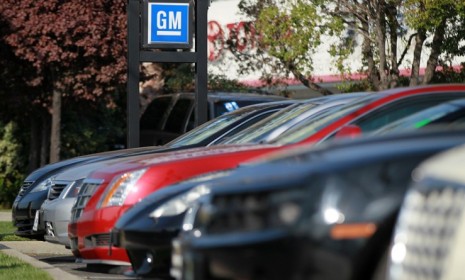G.M.'s record-smashing profits: 6 talking points
The 103-year-old automaker just had its best year ever. So why is it acting like a "company on the rocks"?

A free daily email with the biggest news stories of the day – and the best features from TheWeek.com
You are now subscribed
Your newsletter sign-up was successful
General Motors hauled in a record profit in 2011, and regained its status as the world's top seller of automobiles. It's an extraordinary comeback for a company that went through bankruptcy only two years ago, and needed a massive $50 billion government bailout to boot. "So why isn't everyone doing handsprings or uncorking champagne?" asks Michelle Krebs at Forbes. Here, six things you should know about G.M.'s record year and ongoing recovery:
1. G.M. racked up hugely impressive sales figures
The famed automaker made a $7.6 billion profit in 2011, surpassing its previous yearly record of $6.7 billion in 1997. With global sales of 9 million automobiles, G.M. is once again the world's number-one automaker, a crown that had been usurped by Toyota in 2008. On news of the record profits, G.M.'s stock price rose to $27.17, a six-month high. And G.M.'s workers will get a slice of the cake, too — more than 47,000 unionized workers will each receive a profit-sharing check of $7,000.
The Week
Escape your echo chamber. Get the facts behind the news, plus analysis from multiple perspectives.

Sign up for The Week's Free Newsletters
From our morning news briefing to a weekly Good News Newsletter, get the best of The Week delivered directly to your inbox.
From our morning news briefing to a weekly Good News Newsletter, get the best of The Week delivered directly to your inbox.
2. But in some ways, the game is rigged
G.M.'s sales are still below pre-recession levels. Its profits are largely a result of an orchestrated bankruptcy that has allowed G.M. to pay its debts, renegotiate cumbersome labor contracts, shutter plants, and phase out flagging brands. Plus, under its bailout deal with the government, G.M. pays hardly any U.S. taxes.
3. Europe puts G.M. in a troubling bind
G.M.'s European operations, which include the Opel brand, lost $747 million in 2011. With the Continent's debt crisis showing few signs of abating, Europe could hobble G.M. for years. That's likely why G.M. says its European branch will undergo a major cost-cutting overhaul in 2012.
A free daily email with the biggest news stories of the day – and the best features from TheWeek.com
4. Many G.M. workers aren't happy
G.M. is still tens of billions of dollars short on what it will need to meet its future pension obligations. And even with new profit-sharing rules, not all G.M. workers are making out like bandits — the automaker's 26,000 salaried employees in the U.S. will see their bonuses reduced in 2011, and their pay frozen in 2012.
5. Don't count out Toyota and Honda
G.M.'s foreign rivals faced serious challenges in 2011. The devastating earthquake and tsunami in Japan crippled the production lines of Toyota and Honda. The Japanese auto giants are expected to make a comeback of their own in 2012, and G.M. will have to "boost incentives to compete," says Krebs.
6. Uncle Sam still has a big stake in G.M.
The U.S. Treasury owns 26 percent of G.M., whose stock price will need to rise to $50 for the government to break even on the bailout. Before selling its stake, the government reportedly wants the stock to rise, at the very least, to its IPO price of $33 a share. So for all the bright spots in G.M.'s ledgers, it still very much seems "like a company on the rocks," writes the Wall Street Journal.
Sources: Bloomberg, CNN, Forbes, The New York Times, The Wall Street Journal